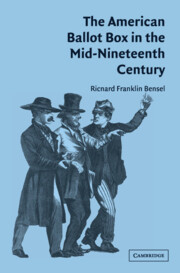Crossref Citations
This Book has been
cited by the following publications. This list is generated based on data provided by Crossref.
Engstrom, Erik J.
and
Kernell, Samuel
2005.
Manufactured Responsiveness: The Impact of State Electoral Laws on Unified Party Control of the Presidency and House of Representatives, 1840–1940.
American Journal of Political Science,
Vol. 49,
Issue. 3,
p.
531.
Harvey, Anna
and
Mukherjee, Bumba
2006.
Electoral Institutions and the Evolution of Partisan Conventions, 1880-1940.
American Politics Research,
Vol. 34,
Issue. 3,
p.
368.
Carson, Jamie L.
Engstrom, Erik J.
and
Roberts, Jason M.
2006.
Redistricting, Candidate Entry, and the Politics of Nineteenth‐Century U.S. House Elections.
American Journal of Political Science,
Vol. 50,
Issue. 2,
p.
283.
John, Richard R.
2006.
Ruling Passions: Political Economy in Nineteenth-Century America.
Journal of Policy History,
Vol. 18,
Issue. 1,
p.
1.
ENGSTROM, ERIK J.
2006.
Stacking the States, Stacking the House: The Partisan Consequences of Congressional Redistricting in the 19th Century.
American Political Science Review,
Vol. 100,
Issue. 3,
p.
419.
Addonizio, Elizabeth M.
Green, Donald P.
and
Glaser, James M.
2007.
Putting the Party Back into Politics: An Experiment
Testing Whether Election Day Festivals Increase Voter
Turnout.
PS: Political Science & Politics,
Vol. 40,
Issue. 4,
p.
721.
CARSON, JAMIE L.
ENGSTROM, ERIK J.
and
ROBERTS, JASON M.
2007.
Candidate Quality, the Personal Vote, and the Incumbency Advantage in Congress.
American Political Science Review,
Vol. 101,
Issue. 2,
p.
289.
Horner, Jennifer Ruth
and
Brewin, Mark
2007.
The Salt River Ticket, Democratic Discourse, and Nineteenth Century American Politics.
Critical Studies in Media Communication,
Vol. 24,
Issue. 1,
p.
1.
Herrnson, Paul S.
Niemi, Richard G.
Hanmer, Michael J.
Francia, Peter L.
Bederson, Benjamin B.
Conrad, Frederick G.
and
Traugott, Michael W.
2008.
Voters' Evaluations of Electronic Voting Systems.
American Politics Research,
Vol. 36,
Issue. 4,
p.
580.
Craig, Jeremy S.
Pierre, Joseph N.
Townsend, Mark
Hart, Gary W.
and
Cox, Derek R.
2009.
Toward a system of checks and balances for electronic voting machines.
p.
142.
Robertson, Craig
2009.
A DOCUMENTARY REGIME OF VERIFICATION.
Cultural Studies,
Vol. 23,
Issue. 3,
p.
329.
Gerber, Alan S.
Green, Donald P.
and
Larimer, Christopher W.
2010.
An Experiment Testing the Relative Effectiveness of Encouraging Voter Participation by Inducing Feelings of Pride or Shame.
Political Behavior,
Vol. 32,
Issue. 3,
p.
409.
Hafner-Burton, Emilie Marie
Hyde, Susan D.
and
Jablonski, Ryan S.
2011.
Surviving Elections: Election Violence and Leader Tenure.
SSRN Electronic Journal,
Alvarez, R. Michael
Hall, Thad E.
Levin, Ines
and
Stewart, Charles
2011.
Voter Opinions about Election Reform: Do They Support Making Voting More Convenient?.
Election Law Journal: Rules, Politics, and Policy,
Vol. 10,
Issue. 2,
p.
73.
Hogan, Richard
2011.
Resisting Redemption.
Social Science History,
Vol. 35,
Issue. 2,
p.
133.
Barreyre, Nicolas
2011.
The Politics of Economic Crises: The Panic of 1873, the End of Reconstruction, and the Realignment of American Politics.
The Journal of the Gilded Age and Progressive Era,
Vol. 10,
Issue. 4,
p.
403.
Baughman, John
and
Nokken, Timothy
2011.
The Electoral Connection and Participation on House Roll Call Votes, 1819-1921.
SSRN Electronic Journal,
Carson, Jamie L.
and
Jenkins, Jeffery A.
2011.
Examining the Electoral Connection Across Time.
Annual Review of Political Science,
Vol. 14,
Issue. 1,
p.
25.
Anzia, Sarah F.
2012.
Partisan Power Play: The Origins of Local Election Timing as an American Political Institution.
Studies in American Political Development,
Vol. 26,
Issue. 1,
p.
24.
RICCI, PAOLO
and
PORTO ZULINI, JAQUELINE
2012.
‘Beheading’, Rule Manipulation and Fraud: The Approval of Election Results in Brazil, 1894–1930.
Journal of Latin American Studies,
Vol. 44,
Issue. 3,
p.
495.



